L.C. Clark's Blog, page 2
November 12, 2018
The Songs in A Star is Born Did It
I wrote an article about my reaction to watching Lady Gaga’s version of A Star is Born. I had seen Barbra Streisand’s version of the same movie in the 70’s. That one didn’t make me cry. I can’t figure out why Lady Gaga’s version got me holding my tears from the get go. I was sobbing in my car on my way home. “After I was all cried out, I sat and wondered why the movie moved me to tears.”
For weeks I watched the soundtrack YouTube videos over and over. I realized the lyrics of the songs triggered my crying fit. Here’s why:
I'll Never Love Again
Wish I could, I could've said goodbyeI would've said what I wanted toMaybe even cried for youIf I knew it would be the last time…
When we first metI never thought that I would fallI never thought that I'd find myselfLying in your armsAnd I want to pretend that it's not trueOh baby, that you're gone‘Cause my world keeps turning, and turning, and turningAnd I’m not moving on
The character named Sugar in the book The Email Ordered Wife left me and his daughter without saying goodbye. That morning was the last time we saw him.
My unexpected crying fit told me “I’m not moving on” Always Remember Us This Way
You’re where I wanna goThe part of me that’s you will never die
Every time we say goodbyeBaby, it hurts
When you look at meAnd the whole world fadesI'll always remember us this way
Sugar died in Dallas. I immigrated from the Philippines
That wasn’t the first time he left us but I didn’t think it would be the last.
When he looked at me, I literally didn’t see anything else. I did not even my see my husband standing a foot in front of us.
I'll Never Love Again
See also:A Star is Born Made Me Cry The Email Ordered Wife – 2nd Edition The Email Ordered Wife
For weeks I watched the soundtrack YouTube videos over and over. I realized the lyrics of the songs triggered my crying fit. Here’s why:
I'll Never Love Again
Wish I could, I could've said goodbyeI would've said what I wanted toMaybe even cried for youIf I knew it would be the last time…
When we first metI never thought that I would fallI never thought that I'd find myselfLying in your armsAnd I want to pretend that it's not trueOh baby, that you're gone‘Cause my world keeps turning, and turning, and turningAnd I’m not moving on
The character named Sugar in the book The Email Ordered Wife left me and his daughter without saying goodbye. That morning was the last time we saw him.
My unexpected crying fit told me “I’m not moving on” Always Remember Us This Way
You’re where I wanna goThe part of me that’s you will never die
Every time we say goodbyeBaby, it hurts
When you look at meAnd the whole world fadesI'll always remember us this way
Sugar died in Dallas. I immigrated from the Philippines
That wasn’t the first time he left us but I didn’t think it would be the last.
When he looked at me, I literally didn’t see anything else. I did not even my see my husband standing a foot in front of us.
I'll Never Love Again
See also:A Star is Born Made Me Cry The Email Ordered Wife – 2nd Edition The Email Ordered Wife
Published on November 12, 2018 09:40
October 29, 2018
Jehovah’s Witnesses in Russia Similarity to Jews?
 openyoureyespeoplebreakingnews.com
As of September 14, 2018, Russian authorities’ attack on Jehovah’s Witnesses had placed 25 Witnesses in detention and 9 under house arrest, as “extremist”. In July, the first female Witness was placed in detention, setting a precedent beyond the holocaust. If convicted, some of those who have been arrested face prison terms of up to ten years.
openyoureyespeoplebreakingnews.com
As of September 14, 2018, Russian authorities’ attack on Jehovah’s Witnesses had placed 25 Witnesses in detention and 9 under house arrest, as “extremist”. In July, the first female Witness was placed in detention, setting a precedent beyond the holocaust. If convicted, some of those who have been arrested face prison terms of up to ten years.Heavily armed police forcibly enter Witnesses’ homes, pointing guns at the heads of children and the elderly. While the government search and confiscate valuable belongings reminiscent of Hitler’s treatment of Jews in WWII, this is where the similarities with the Jews end.
 On Saturday, October 27, 2018, shooting at The Tree of Life Synagogue killed eleven people and a number of others were injured. Paris darkened the Eiffel Tower to show solidarity. In Boston, religious, political, and civic leaders offered support. In Seattle, communities came together to support and stand in solidarity with the victims of the tragedy.
On Saturday, October 27, 2018, shooting at The Tree of Life Synagogue killed eleven people and a number of others were injured. Paris darkened the Eiffel Tower to show solidarity. In Boston, religious, political, and civic leaders offered support. In Seattle, communities came together to support and stand in solidarity with the victims of the tragedy.

Now, may I ask, where’s the support of countries for the Jehovah’s Witnesses being persecuted in Russia? Where is the outrage at the injustice in Jehovah’s Witnesses’ being prosecuted for peaceful worship? Where is the American government’s sanction against the blatant human rights violations? Where is the Amnesty International that fights for the release of subversives? I’m just saying...
“For this is what Jehovah of armies says, who after being glorified has sent me to the nations that were plundering you ‘Whoever touches you touches the pupil of my eye.” (Zechariah 2:8)
See also:An Open Letter to President Vladimir Putin With Spirit and TruthAbraham Lincoln's Prophesy, Las Vegas Shooting
Published on October 29, 2018 11:58
October 24, 2018
A Star is Born Made Me Cry
 By Source, Fair use,
I don’t particularly fancy musicals but I saw Barbra Streisand’s version of A Star is Born in the 70’s. I felt I owe it to myself to see Lady Gaga’s version. It’s Rated R for alcohol and drug abuse, and very little physical violence.
By Source, Fair use,
I don’t particularly fancy musicals but I saw Barbra Streisand’s version of A Star is Born in the 70’s. I felt I owe it to myself to see Lady Gaga’s version. It’s Rated R for alcohol and drug abuse, and very little physical violence.Jehovah’s Witnesses are discouraged from watching anything other than rated Rated G for General Audiences or Rated PG or Parental Guidance Suggested. However, unless specified in the Bible, I let my conscience be the guide. As an adult who has lived a hundred lives, I figured scenes with alcohol, drug abuse and physical violence isn’t going to move me. After all, I grew up in Pasay City, Philippines, where as a child, I ran to the streets to watch brawls, I drank from my teens to my 30’s, until I became a Jehovah’s Witness. Now, drug abuse was rampant in Pasay City, as anywhere else these days. That I never touched. Liquor kills the liver. Drugs kill the brain cells. There’s no transplant for brain.
I went in the theater without a clue of how this movie will touch me. Lady Gaga’s first song is a magnificent rendition of La Vie en rose. I’ve seen her in YouTube. I knew she’s good, but this performance stunned me to the verge of tears. It’s not easy to make me cry, ask any of my ex-husbands. The entire movie is superb! Bradley Cooper is revealed like you have not seen him before!
I watched the movie holding my tears until the credits rolled. Then I let it out. When the lights went on, I composed myself and walked out of the mall to the parking into my car. As soon I got in, I was sobbing. After I was all cried out, I sat and wondered why the movie moved me to tears. My father died in August, last year. I haven’t cried for that. I don’t know when and if it’s going to come. I lost an ex-husband to addiction in 2009. I have not cried over that and probably never will. I can show sympathy and anger openly, readily sometimes instantly. I have lost a lot of people in my life, but love and grief seems to be buried so deep in my core. They come to the surface, as once in a while it does, then I can no longer tell for whom.
“mere man sees what appears to the eyes, but Jehovah sees into the heart.” (1 Samuel 16:7)
See also:Mission Impossible–Fallout’s Analogy to REBEL Three Generations of Movie Enthusiasts DNA, Wine and Injustice
Published on October 24, 2018 18:19
October 21, 2018
The Importance of Education to Filipinos
 EB Scholars - photo by GMA Eat Bulaga, a noon time television show in the Philippines, launched in 2009, “Eat, Bulaga! Excellent Student Awards or EBest Awards”, a scholarship aimed to help less fortunate elementary and high school students from different regions to continue on to their secondary and tertiary education. The program provided full scholarship, monthly allowances and cash assistance.
EB Scholars - photo by GMA Eat Bulaga, a noon time television show in the Philippines, launched in 2009, “Eat, Bulaga! Excellent Student Awards or EBest Awards”, a scholarship aimed to help less fortunate elementary and high school students from different regions to continue on to their secondary and tertiary education. The program provided full scholarship, monthly allowances and cash assistance.One of the students awarded worked in building construction so he can finish high school. It is not legal to hire child labor, worst of all, in construction. That boy graduated with honors and moved forward to a college education courtesy of Eat Bulaga.
Another student walked kilometers to get to school each day. Another one did home work by candlelight. At least one worked as a housemaid to finance her high school education. These are students who accumulated medals and awards for academic excellence despite the poor living condition and no clear hope of getting to college.
The scholars of Eat Bulaga, have earned their top grades without the best of school supplies, without owning a computer and not enough books but they make do by using the public library or borrowing books from better situated classmates. They managed their time between house chores, earning a living and school work.
In America, students are given cash incentives to finish high school. Otherwise they can get a GED, the General Educational Development tests when passed, provide certification of high school-level academic skills. Then, they can get a college loan, if they qualify, and pay the loan for decades after graduation.
 President Duterte Meanwhile, in the third world, a most maligned president, President Rodrigo Duterte, signed into a law in August 3, 2017, a bill granting free tuition and other fees for students in state universities and colleges, as well as local universities and colleges and technical-vocational institutions. “The president believed the benefits of the law outweighed the potential short-term budgetary challenges..” (www.reuters.com)
President Duterte Meanwhile, in the third world, a most maligned president, President Rodrigo Duterte, signed into a law in August 3, 2017, a bill granting free tuition and other fees for students in state universities and colleges, as well as local universities and colleges and technical-vocational institutions. “The president believed the benefits of the law outweighed the potential short-term budgetary challenges..” (www.reuters.com)President Duterte's free college tuition investment will earn the country a return in all sorts of currencies. In 2013, an estimated 10.2 million people of Filipinos worked abroad. It is one of the largest number of migrant workers, scattered over 100 countries. They are called Overseas Filipino Workers (OFW). Those workers will remit their pay back to the Philippines by official and unofficial, including illegal channels. In 2011, remittances reached US$20.117 billion. Imagine what the numbers will be in four years or so, when all the current college students graduate and join the OFWs. Another positive effect of migrant workers is they bring home skills gained abroad and pave the way for the coming generations of Filipinos.
See also:Pasay City Kids The Girl They Called ‘Manila Times’ Nature's Toys
Published on October 21, 2018 20:58
October 14, 2018
Dysmorphia
 Dysmorphia is a word seldom heard or read. It’s a character disorder that obsessively perceive severe flaws in one’s own face, body or general appearance. This warrants exceptional measures to hide or fix the flaw. Exceptional measures range from over the counter cosmetic to cosmetic surgery. It usually starts during adolescence when both boys and girls are preoccupied with their looks.
Dysmorphia is a word seldom heard or read. It’s a character disorder that obsessively perceive severe flaws in one’s own face, body or general appearance. This warrants exceptional measures to hide or fix the flaw. Exceptional measures range from over the counter cosmetic to cosmetic surgery. It usually starts during adolescence when both boys and girls are preoccupied with their looks. Even if factual, the significance of the flaw may be severely exaggerated. The nose for example differ according to race although it serves the same purpose for all. It could either be too flat, too big, or too small. Rhinoplasty is the first and most elected cosmetic surgery for non-Caucasians. Who made the Caucasian nose the standard of perfection? The world can’t remember.
We all believe mirrors can’t lie, so we believe what we see. The sad thing is that flaw could be imagined. A dysmorphic person might actually be good looking but see ugly when in front of the mirror. At the very least, the person sees a different face in the mirror from what other people see. The dysmorphic view is so distorted that compliments don’t help. It sounds like that nobody else is telling the truth about it.
When I attended a photography training with Kodak, Philippines, it was said that cameras don’t lie. So, I thought, just like a mirror. Then, people found discrepancy between the photo and the mirror image. The word photogenic was invented. It meant that faces not generally pretty or may be even unattractive when photographed can produce an attractive image.
In one of our conversations, my daughter called me “dysmorphic”. I never heard the word before. I had to look it up. I looked at my photos, then looked in the mirror. That settled it, I’m photogenic. My daughter loves to play psychiatrist. She said no one could convince me that I look good.
I remembered Reb, the hero in REBEL, in a conversation with his comrades, said about me, in my presence, “She doesn’t know she’s beautiful.” He said it not like flattery, but like an observation.
Ten years later, I met the love of my life. He once said to me “Do you know, you’re foxy?”
“Oh, I look like a fox?” I made a pun about his compliment.
When I got home that night, I looked at myself in the mirror. I didn’t see foxy, didn’t see beautiful either.
See also:The Song Perfect Matches REBEL The Shallowness of Youth High School Girls
Published on October 14, 2018 19:02
October 1, 2018
Fighting the Signs of Aging
In the Philippines, it’s easy to cheat on one’s age. Trust me, I applied for a job as twenty five when I was nineteen. Then, decades later I got a job as 36 years old when I was 46. I’m a workaholic and planned on working till I’m 80+. I won’t mind dropping dead in my workstation.
In my late twenties, I read in a women’s magazine an article about the signs of aging and that it could be prevented. Aging cannot be prevented. It’s the nature of all beings, men or animals but the signs that makes aging noticeable can be put off. I bought the idea because I know that employers worldwide discriminate against the aged. If I looked 35 at 80 I will be hired. If I looked 60 at 40 I will have a hard time getting a job.
Here are the body parts that show aging.
 My veneers at 66 years old1. Teeth – brushing, flossing, dental cleaning are not enough. Gums recede with age. Receding gums will make the teeth recede with it so that they look smaller than they were some decades back. Dental porcelain veneers or dental laminates are called ‘jacket’ in the Philippines. They are custom-made to cover the surface of teeth not only to improve appearance but also to protect the natural teeth from bacteria that form cavities. These are bonded to the teeth to maintain color, improve shape, size, or length. In my case I had it made longer than my natural teeth so that should the gum the recede they will still look the same previous size. Veneer is expensive but I figured I work, I am the means of production. I deserve to be maintained. I invested in myself.
My veneers at 66 years old1. Teeth – brushing, flossing, dental cleaning are not enough. Gums recede with age. Receding gums will make the teeth recede with it so that they look smaller than they were some decades back. Dental porcelain veneers or dental laminates are called ‘jacket’ in the Philippines. They are custom-made to cover the surface of teeth not only to improve appearance but also to protect the natural teeth from bacteria that form cavities. These are bonded to the teeth to maintain color, improve shape, size, or length. In my case I had it made longer than my natural teeth so that should the gum the recede they will still look the same previous size. Veneer is expensive but I figured I work, I am the means of production. I deserve to be maintained. I invested in myself.
 My neck at 66 years old2. Neck – the face and the rest of the body can be hidden or enhanced with makeup and clothes. The neck, however, will be hard to hide, unless you’re a Catholic nun. Thus, it needs continuous, dutiful care. It has been said, heard and maybe believed or not that inadvertent pulling the skin down will create wrinkles. So, since I read that article, to this day, I apply cosmetics going towards the side instead of up and down. And here’s the result. Does that neck look 66 years old to you? A mere 4 years to 70?!
My neck at 66 years old2. Neck – the face and the rest of the body can be hidden or enhanced with makeup and clothes. The neck, however, will be hard to hide, unless you’re a Catholic nun. Thus, it needs continuous, dutiful care. It has been said, heard and maybe believed or not that inadvertent pulling the skin down will create wrinkles. So, since I read that article, to this day, I apply cosmetics going towards the side instead of up and down. And here’s the result. Does that neck look 66 years old to you? A mere 4 years to 70?!
3. Eye lids – eye lids have a tendency to droop with age. There’s no way to go around it. I had monolid eyes. When I developed eye bags in my 40’s I went to a plastic surgeon to remove the eye bags. He suggested that I have the lids folded surgically as well. He said that the lids will droop as I age so if I get it folded I may get away with it.
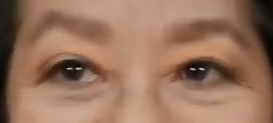 My eyelids at 66 years old So here’s my folded eyelids, instead of drooping down the aging skin goes inside the fold. And putting on eye makeup got easier. Eye liners hide under the monolid. Ask any Asian.
My eyelids at 66 years old So here’s my folded eyelids, instead of drooping down the aging skin goes inside the fold. And putting on eye makeup got easier. Eye liners hide under the monolid. Ask any Asian.
See also:The Importance of CollagenHousehold Thrift TipsBeing a Girl
In my late twenties, I read in a women’s magazine an article about the signs of aging and that it could be prevented. Aging cannot be prevented. It’s the nature of all beings, men or animals but the signs that makes aging noticeable can be put off. I bought the idea because I know that employers worldwide discriminate against the aged. If I looked 35 at 80 I will be hired. If I looked 60 at 40 I will have a hard time getting a job.
Here are the body parts that show aging.
 My veneers at 66 years old1. Teeth – brushing, flossing, dental cleaning are not enough. Gums recede with age. Receding gums will make the teeth recede with it so that they look smaller than they were some decades back. Dental porcelain veneers or dental laminates are called ‘jacket’ in the Philippines. They are custom-made to cover the surface of teeth not only to improve appearance but also to protect the natural teeth from bacteria that form cavities. These are bonded to the teeth to maintain color, improve shape, size, or length. In my case I had it made longer than my natural teeth so that should the gum the recede they will still look the same previous size. Veneer is expensive but I figured I work, I am the means of production. I deserve to be maintained. I invested in myself.
My veneers at 66 years old1. Teeth – brushing, flossing, dental cleaning are not enough. Gums recede with age. Receding gums will make the teeth recede with it so that they look smaller than they were some decades back. Dental porcelain veneers or dental laminates are called ‘jacket’ in the Philippines. They are custom-made to cover the surface of teeth not only to improve appearance but also to protect the natural teeth from bacteria that form cavities. These are bonded to the teeth to maintain color, improve shape, size, or length. In my case I had it made longer than my natural teeth so that should the gum the recede they will still look the same previous size. Veneer is expensive but I figured I work, I am the means of production. I deserve to be maintained. I invested in myself. My neck at 66 years old2. Neck – the face and the rest of the body can be hidden or enhanced with makeup and clothes. The neck, however, will be hard to hide, unless you’re a Catholic nun. Thus, it needs continuous, dutiful care. It has been said, heard and maybe believed or not that inadvertent pulling the skin down will create wrinkles. So, since I read that article, to this day, I apply cosmetics going towards the side instead of up and down. And here’s the result. Does that neck look 66 years old to you? A mere 4 years to 70?!
My neck at 66 years old2. Neck – the face and the rest of the body can be hidden or enhanced with makeup and clothes. The neck, however, will be hard to hide, unless you’re a Catholic nun. Thus, it needs continuous, dutiful care. It has been said, heard and maybe believed or not that inadvertent pulling the skin down will create wrinkles. So, since I read that article, to this day, I apply cosmetics going towards the side instead of up and down. And here’s the result. Does that neck look 66 years old to you? A mere 4 years to 70?!3. Eye lids – eye lids have a tendency to droop with age. There’s no way to go around it. I had monolid eyes. When I developed eye bags in my 40’s I went to a plastic surgeon to remove the eye bags. He suggested that I have the lids folded surgically as well. He said that the lids will droop as I age so if I get it folded I may get away with it.
 My eyelids at 66 years old So here’s my folded eyelids, instead of drooping down the aging skin goes inside the fold. And putting on eye makeup got easier. Eye liners hide under the monolid. Ask any Asian.
My eyelids at 66 years old So here’s my folded eyelids, instead of drooping down the aging skin goes inside the fold. And putting on eye makeup got easier. Eye liners hide under the monolid. Ask any Asian.See also:The Importance of CollagenHousehold Thrift TipsBeing a Girl
Published on October 01, 2018 00:39
September 24, 2018
Prop 8, CA – 2018 – My Choice
In the previous article, 2018 Proposition 8, California, on Dialysis Treatment, I gave the pros and cons arguments as neutral as I can. I also stated there that “I am a Jehovah’s Witness. We don’t vote. I am also a dialysis patient who will be impacted by Proposition 8, one way or another.” My article received a comment that said I should exercise my right to vote. That comment got me thinking. If I were voting, which way will I be going? Here’s what my deliberation told me:
The ‘yes’ vote contends that dialysis clinics are getting over 115% of profits. It specifically targets the two top California dialysis corporations, “DaVita and Fresenius, made nearly $4 billion in profits from their dialysis operations in the United States in 2016”.
Fresenius claims to be “at the forefront of high-flux dialysis technology, providing Nephrologists the solutions to allow for the continuous enhancement of dialysis treatment. And today, over 90% of the machines utilized in the provision of hemodialysis are manufactured by Fresenius Medical Care.”
DaVita may not have the same bragging rights, however, “In 2017, the federal government agreed to pay DaVita $538 million to settle … U.S. Dept. of Veterans Affairs underpaid for dialysis services to veterans between 2005 and 2011.” A greedy company would not have continued to serve veterans while underpaid.
Prop 8 claims that a ‘yes’ vote would refund money to patients or patients’ insurance payers. I am betting the refund to patients will be minimal or nothing because the insurance pays most of the cost of dialysis. Thus, this vote only serves the insurance companies.
A ‘no’ vote lets the dialysis clinic keep the profits all and above 115% percent. It deprives the insurance companies the refunds they want, but the insurance companies are paid in premiums, either by the patient or American Kidney Fund, etc. On the claim that the dialysis center’s profits are pocketed rather than spent on improving the quality of care, my question is, how will giving that profit to insurance companies “improve the quality of care”?
In short, the Prop 8 is merely a tug of war over the money between insurance companies and dialysis clinics. Both sides, agree that missing dialysis treatments will kill the patient. As a dialysis patient, on the side of patients’ welfare, who do I want to hand that money? The dialysis providers are keeping us alive. The insurance companies will simply move on to other customers after we die.
Again, I reiterate that I am a Jehovah’s Witness. I am not voting because voting will give Jehovah God the impression that I don't trust he will take care of me.
See also:2018 Proposition 8, California, on Dialysis Treatment Response to John Oliver About DaVita Medicare Entitlement for Dialysis
The ‘yes’ vote contends that dialysis clinics are getting over 115% of profits. It specifically targets the two top California dialysis corporations, “DaVita and Fresenius, made nearly $4 billion in profits from their dialysis operations in the United States in 2016”.
Fresenius claims to be “at the forefront of high-flux dialysis technology, providing Nephrologists the solutions to allow for the continuous enhancement of dialysis treatment. And today, over 90% of the machines utilized in the provision of hemodialysis are manufactured by Fresenius Medical Care.”
DaVita may not have the same bragging rights, however, “In 2017, the federal government agreed to pay DaVita $538 million to settle … U.S. Dept. of Veterans Affairs underpaid for dialysis services to veterans between 2005 and 2011.” A greedy company would not have continued to serve veterans while underpaid.
Prop 8 claims that a ‘yes’ vote would refund money to patients or patients’ insurance payers. I am betting the refund to patients will be minimal or nothing because the insurance pays most of the cost of dialysis. Thus, this vote only serves the insurance companies.
A ‘no’ vote lets the dialysis clinic keep the profits all and above 115% percent. It deprives the insurance companies the refunds they want, but the insurance companies are paid in premiums, either by the patient or American Kidney Fund, etc. On the claim that the dialysis center’s profits are pocketed rather than spent on improving the quality of care, my question is, how will giving that profit to insurance companies “improve the quality of care”?
In short, the Prop 8 is merely a tug of war over the money between insurance companies and dialysis clinics. Both sides, agree that missing dialysis treatments will kill the patient. As a dialysis patient, on the side of patients’ welfare, who do I want to hand that money? The dialysis providers are keeping us alive. The insurance companies will simply move on to other customers after we die.
Again, I reiterate that I am a Jehovah’s Witness. I am not voting because voting will give Jehovah God the impression that I don't trust he will take care of me.
See also:2018 Proposition 8, California, on Dialysis Treatment Response to John Oliver About DaVita Medicare Entitlement for Dialysis
Published on September 24, 2018 19:54
September 17, 2018
2018 CA Prop 8 - Dialysis Treatment
The 2008 Proposition 8, was a California ballot proposition for a state constitutional amendment to oppose same-sex marriage. Proposition 8 was ultimately ruled unconstitutional in 2010. After a lot of contention in and out of court, same-sex marriages in California resumed in 2013. This shows Proposition 8’s effect on life as we know it.
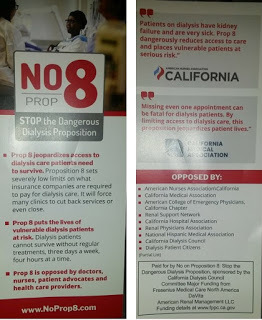
Today’s Proposition 8 is just as contentious. The Proponents of California's Proposition 8 says, “Proposition 8 would improve the quality of care for the 66,000 Californians who are on dialysis, and that’s why the initiative is supported by the California Democratic Party; CalPERS, the nation’s largest public pension fund; firefighters; patients; healthcare advocates; dialysis workers; veterans; and 130 other community groups, labor unions and churches.”
The flyer above says, “California Proposition 8 sets severely low limits on what insurance companies are required to pay for dialysis care… These limits do not cover the cost...forcing many dialysis clinics to cut back services or even close.”
In terms of insurance payments, “a ‘yes’ vote requires dialysis clinics to issue refunds to patients or patients’ payers for revenue above 115% of the costs of direct patient care and healthcare improvements.” That means the clinics are paid 100% + 15% profit, only the excess over the 15% will be refunded to the payer.
“A ‘no’ vote opposes refunds to patients or patients’ payers, the dialysis clinics gets to keep the profits all and above 115% percent.
A Mercury News Editorial says, “The complex initiative designed to regulate the dialysis industry is better suited for the Legislature, (not a ballot measure) where the wording of new laws can be thoroughly vetted and easily altered if problems arise.”
The Legislature has already spoken on this issue way back in 1972. Public Law 92-603, 92nd Congress, H.R. 1 qualified all dialysis patients for Medicare benefits. Patients, their families, and physicians, as well as the National Kidney Foundation, lobbied to get the federal and state governments to provide financial coverage for treatment of kidney disease. Congress passed it, and President Richard M. Nixon signed the Social Security Amendments of 1972 getting him overwhelmingly reelected. This law is based on the United States Declaration of Independence guarantee of “life, liberty…” just as both pro and con of the current Proposition 8, both sides, agree that missing dialysis treatments will kill the patient.
I am a Jehovah’s Witness. We don’t vote. I am also a dialysis patient who will be impacted by Proposition 8, one way or another. I have laid out the arguments from both sides as neutral as I can. It’s up to the rest of California dialysis patients to decide which way they want to go on this. Whatever happens, I trust Jehovah God will take care of me as he has done, through all these years of my living dangerously.See also:
Prop 8, CA – 2018 – My ChoiceMedicare Entitlement for Dialysis Guarantee to Life is Constitutional
Response to John Oliver About DaVita

Today’s Proposition 8 is just as contentious. The Proponents of California's Proposition 8 says, “Proposition 8 would improve the quality of care for the 66,000 Californians who are on dialysis, and that’s why the initiative is supported by the California Democratic Party; CalPERS, the nation’s largest public pension fund; firefighters; patients; healthcare advocates; dialysis workers; veterans; and 130 other community groups, labor unions and churches.”
The flyer above says, “California Proposition 8 sets severely low limits on what insurance companies are required to pay for dialysis care… These limits do not cover the cost...forcing many dialysis clinics to cut back services or even close.”
In terms of insurance payments, “a ‘yes’ vote requires dialysis clinics to issue refunds to patients or patients’ payers for revenue above 115% of the costs of direct patient care and healthcare improvements.” That means the clinics are paid 100% + 15% profit, only the excess over the 15% will be refunded to the payer.
“A ‘no’ vote opposes refunds to patients or patients’ payers, the dialysis clinics gets to keep the profits all and above 115% percent.
A Mercury News Editorial says, “The complex initiative designed to regulate the dialysis industry is better suited for the Legislature, (not a ballot measure) where the wording of new laws can be thoroughly vetted and easily altered if problems arise.”
The Legislature has already spoken on this issue way back in 1972. Public Law 92-603, 92nd Congress, H.R. 1 qualified all dialysis patients for Medicare benefits. Patients, their families, and physicians, as well as the National Kidney Foundation, lobbied to get the federal and state governments to provide financial coverage for treatment of kidney disease. Congress passed it, and President Richard M. Nixon signed the Social Security Amendments of 1972 getting him overwhelmingly reelected. This law is based on the United States Declaration of Independence guarantee of “life, liberty…” just as both pro and con of the current Proposition 8, both sides, agree that missing dialysis treatments will kill the patient.
I am a Jehovah’s Witness. We don’t vote. I am also a dialysis patient who will be impacted by Proposition 8, one way or another. I have laid out the arguments from both sides as neutral as I can. It’s up to the rest of California dialysis patients to decide which way they want to go on this. Whatever happens, I trust Jehovah God will take care of me as he has done, through all these years of my living dangerously.See also:
Prop 8, CA – 2018 – My ChoiceMedicare Entitlement for Dialysis Guarantee to Life is Constitutional
Response to John Oliver About DaVita
Published on September 17, 2018 11:21
2018 Proposition 8, California, on Dialysis Treatment
The 2008 Proposition 8, was a California ballot proposition for a state constitutional amendment to oppose same-sex marriage. Proposition 8 was ultimately ruled unconstitutional in 2010. After a lot of contention in and out of court, same-sex marriages in California resumed in 2013. This shows Proposition 8’s effect on life as we know it.

Today’s Proposition 8 is just as contentious. The Proponents of California's Proposition 8 says, “Proposition 8 would improve the quality of care for the 66,000 Californians who are on dialysis, and that’s why the initiative is supported by the California Democratic Party; CalPERS, the nation’s largest public pension fund; firefighters; patients; healthcare advocates; dialysis workers; veterans; and 130 other community groups, labor unions and churches.”
The flyer above says, “California Proposition 8 sets severely low limits on what insurance companies are required to pay for dialysis care… These limits do not cover the cost...forcing many dialysis clinics to cut back services or even close.”
In terms of insurance payments, “a ‘yes’ vote requires dialysis clinics to issue refunds to patients or patients’ payers for revenue above 115% of the costs of direct patient care and healthcare improvements.” That means the clinics are paid 100% + 15% profit, only the excess over the 15% will be refunded to the payer.
“A ‘no’ vote opposes refunds to patients or patients’ payers, the dialysis clinics gets to keep the profits all and above 115% percent.
A Mercury News Editorial says, “The complex initiative designed to regulate the dialysis industry is better suited for the Legislature, (not a ballot measure) where the wording of new laws can be thoroughly vetted and easily altered if problems arise.”
The Legislature has already spoken on this issue way back in 1972. Public Law 92-603, 92nd Congress, H.R. 1 qualified all dialysis patients for Medicare benefits. Patients, their families, and physicians, as well as the National Kidney Foundation, lobbied to get the federal and state governments to provide financial coverage for treatment of kidney disease. Congress passed it, and President Richard M. Nixon signed the Social Security Amendments of 1972 getting him overwhelmingly reelected. This law is based on the United States Declaration of Independence guarantee of “life, liberty…” just as both pro and con of the current Proposition 8, both sides, agree that missing dialysis treatments will kill the patient.
I am a Jehovah’s Witness. We don’t vote. I am also a dialysis patient who will be impacted by Proposition 8, one way or another. I have laid out the arguments from both sides as neutral as I can. It’s up to the rest of California dialysis patients to decide which way they want to go on this. Whatever happens, I trust Jehovah God will take care of me as he has done, through all these years of my living dangerously.See also:Medicare Entitlement for Dialysis Guarantee to Life is Constitutional
Response to John Oliver About DaVita

Today’s Proposition 8 is just as contentious. The Proponents of California's Proposition 8 says, “Proposition 8 would improve the quality of care for the 66,000 Californians who are on dialysis, and that’s why the initiative is supported by the California Democratic Party; CalPERS, the nation’s largest public pension fund; firefighters; patients; healthcare advocates; dialysis workers; veterans; and 130 other community groups, labor unions and churches.”
The flyer above says, “California Proposition 8 sets severely low limits on what insurance companies are required to pay for dialysis care… These limits do not cover the cost...forcing many dialysis clinics to cut back services or even close.”
In terms of insurance payments, “a ‘yes’ vote requires dialysis clinics to issue refunds to patients or patients’ payers for revenue above 115% of the costs of direct patient care and healthcare improvements.” That means the clinics are paid 100% + 15% profit, only the excess over the 15% will be refunded to the payer.
“A ‘no’ vote opposes refunds to patients or patients’ payers, the dialysis clinics gets to keep the profits all and above 115% percent.
A Mercury News Editorial says, “The complex initiative designed to regulate the dialysis industry is better suited for the Legislature, (not a ballot measure) where the wording of new laws can be thoroughly vetted and easily altered if problems arise.”
The Legislature has already spoken on this issue way back in 1972. Public Law 92-603, 92nd Congress, H.R. 1 qualified all dialysis patients for Medicare benefits. Patients, their families, and physicians, as well as the National Kidney Foundation, lobbied to get the federal and state governments to provide financial coverage for treatment of kidney disease. Congress passed it, and President Richard M. Nixon signed the Social Security Amendments of 1972 getting him overwhelmingly reelected. This law is based on the United States Declaration of Independence guarantee of “life, liberty…” just as both pro and con of the current Proposition 8, both sides, agree that missing dialysis treatments will kill the patient.
I am a Jehovah’s Witness. We don’t vote. I am also a dialysis patient who will be impacted by Proposition 8, one way or another. I have laid out the arguments from both sides as neutral as I can. It’s up to the rest of California dialysis patients to decide which way they want to go on this. Whatever happens, I trust Jehovah God will take care of me as he has done, through all these years of my living dangerously.See also:Medicare Entitlement for Dialysis Guarantee to Life is Constitutional
Response to John Oliver About DaVita
Published on September 17, 2018 11:21
September 7, 2018
Souvenirs of the Third Man
 Daughter with Star Trek stars At fifty years old, the big 50, the middle age, I was hit by midlife crisis. Twice married with no guy to show for it. My three children have all finished college. My sons were happily married and my daughter was a happy Trekkie, a Star Trek follower. It occurred to me that I was no longer needed as a mother. I prayed and asked Jehovah God that he allows me one last stab at marriage.
Daughter with Star Trek stars At fifty years old, the big 50, the middle age, I was hit by midlife crisis. Twice married with no guy to show for it. My three children have all finished college. My sons were happily married and my daughter was a happy Trekkie, a Star Trek follower. It occurred to me that I was no longer needed as a mother. I prayed and asked Jehovah God that he allows me one last stab at marriage.No one in my circle caught my interest. Where do I find the lucky third? I went to an internet dating site, opened an account highlighting my employment history to show financial promise. I posted my best looking photos and discounted 10 years from my real age. I received responses from single men about my age from the US, England and one Australian geologist working in Saudi Arabia.
The geologist appealed to me but he had a wife in Australia. Then I found a man from Kentucky who was exactly my type, facial hair and a police record. Here are souvenirs of my years in Kentucky:
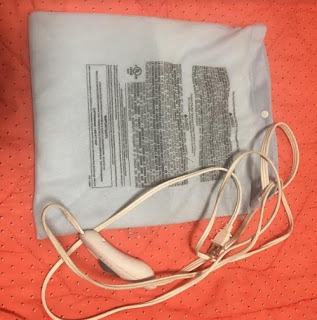
The heating pad he bought for me. It warms the bed before we get in because the bed was always cold despite the centralized heating.
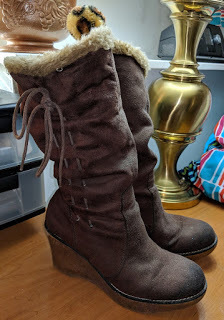
The winter boots he bought me that I still wear once in a while, to this day, after twelve years.
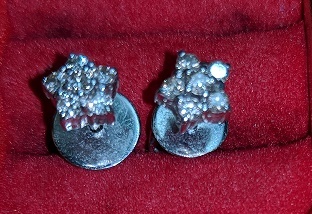
A pair of diamond earrings I bought from the $150 he gave me on a Valentine’s Day. I kept telling him I don’t celebrate those occasions because of my being Jehovah’s Witness. Each time he insisted I buy myself something and show him what I bought.
We traveled to these places:

Hong Kong

Bangkok, Thailand,

Tennessee

Tagaytay, Philippines
September 9, is the anniversary of that third wedding. That marriage went south too. I have no regrets. I gave it my best but as the song says “sometimes love just ain’t enough”.
See also:A Filipina's View of Rural Kentucky Memory is Selective Loving the Job
Published on September 07, 2018 19:36



